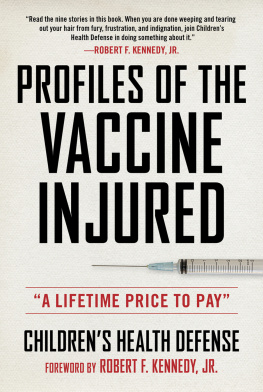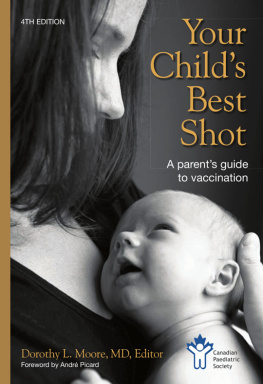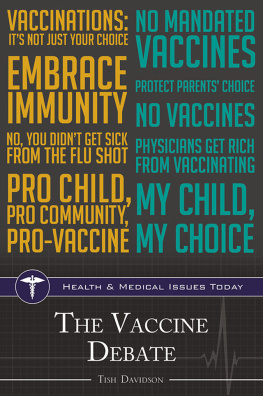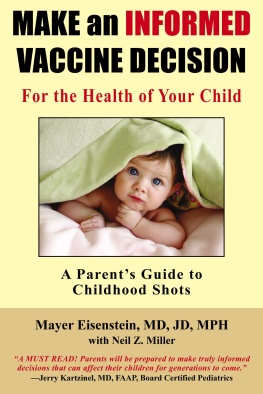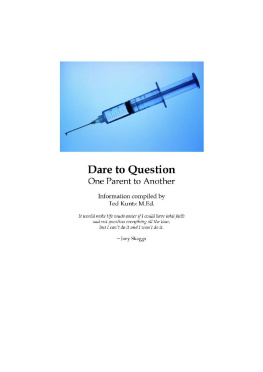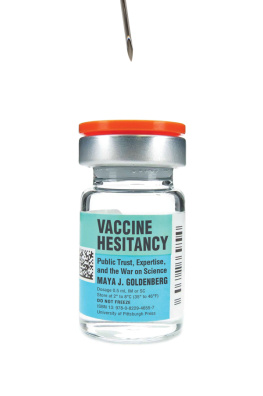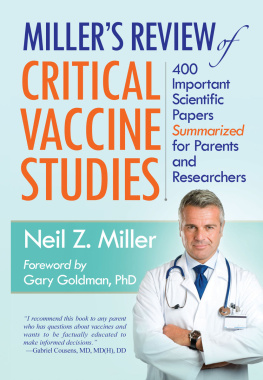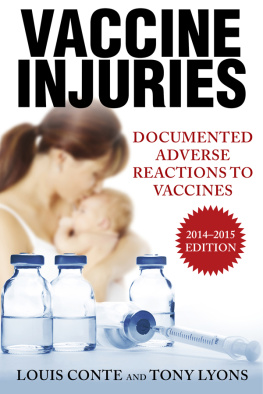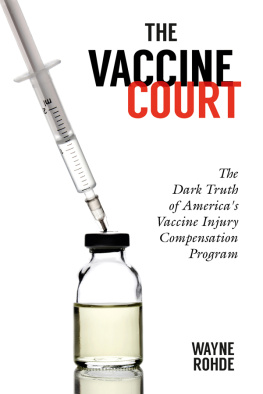
Little, Brown and Company
New York Boston London
To Gregg, a dear friend and rocket scientist who one day asked me a question that really made me think
and
To Cheryl, my dear wife, who asked me to do a little research before we began our childrens vaccines, just to make sure we were doing it right
VISIT DR. BOB SEARS ONLINE AT
WWW.THEVACCINEBOOK.COM OR ON FACEBOOK
I created TheVaccineBook.com to give you the most up-to-date information on vaccines and to offer you the resources that will help keep you informed. Heres what you will find:
Vaccine topics in the news
Opinions and editorials on emerging vaccine issues
How to find a doctor nearby who is friendly toward alternative vaccine schedules
Updates and corrections to The Vaccine Book
Additional vaccine information
Ask vaccine-related questions on the Dr. Bob Sears Facebook page.

I am a pro-vaccine doctor. I am also a pro-information doctor, and todays parents are asking many more questions about vaccines than parents in decades past. In the old days, most parents simply followed their doctors advice and automatically got their children vaccinated. But now virtually every parent has heard that there may be some side effects and other problems with vaccines, and parents are concerned. They dont want their child to catch any serious illnesses, but they want to know the potential risks and side effects of vaccines. The days of doctors being able simply to advise parents to get all vaccines on the regular schedule without any further explanation are over. Parents want to play a more active and informed role in this choice. It is my goal to give you a balanced look at the pros and cons of vaccination so that you can make an educated decision.
I want to be very clear on something right up front. This is not an anti-vaccine book. There are plenty of books out there that overemphasize the potential dangers of vaccines and leave parents even more fearful and confused. I give vaccines in my office every day. I believe vaccines have played a critical role in limiting or eliminating many very serious infectious diseases. But I also understand that vaccines do carry some risk, and its important that parents understand the risks versus the benefits.
As I see it, vaccination isnt an all-or-nothing decision. There are many choices that can be made. Some parents choose all the shots, others choose only some vaccines, and a few parents choose no vaccines. Since there are currently twelve vaccines that are part of the routine childhood immunization schedule, parents have twelve separate decisions to make. When you have finished reading this book, you should have the answers you need to make an educated decision for your child.
To keep things simple, each chapter discusses one vaccine/disease pair. I tell you what each disease is, how common it is, and how serious it is. I next tell you how the vaccine is made, what the ingredients are, and what the possible side effects are. I then discuss the various points parents might consider when deciding if that vaccine is important for their child. At the end of each chapter, I give my own brief summary about each vaccine and its relative importance. I also share my professional experience (if any) with each disease.
Are all vaccines equally important? No. You will learn that some diseases are more common and/or more deadly. Obviously, vaccines to prevent those diseases are more important. But the shots that prevent the extremely rare diseases (like polio and measles) are also necessary, because if such diseases run rampant throughout our nation, there will be some fatalities.
Some people feel that vaccine books arent necessary; after all, why not just ask your doctor if vaccines are absolutely necessary and safe and leave it at that? It takes all of one minute, then youre done. The simple truth is that todays parents want more information. We pediatricians dont always have the time during a regular health checkup to discuss and debate the pros and cons of vaccines thoroughly. Thats why Ive written this book. Ive done the research. Ive spent the last seventeen years learning everything I could about vaccines and the diseases they are designed to prevent, and Ive put it all together in one place so you can get all your questions answered.
There is little doubt that vaccines have played a useful role in eliminating some diseases from our population and limiting many others. Smallpox is a case in point. We stopped giving this vaccine in 1969 because vaccination had succeeded in wiping the disease out in our country. Polio is another example of a disease that is no longer in the United States because of widespread vaccination. Measles, rubella, diphtheria, and HIB have been virtually eradicated as well.
Even though vaccines are important, you as a parent are still entitled to know what you are giving your child. You have a desire (and a responsibility) to make informed health care decisions for your family. Until recently, vaccines were viewed as an automatic part of childhood. But todays parents are taking a more active role in making choices for their childs medical care. Thats what this book is all aboutinformation. Open, honest, complete, and accurate information that all parents can use. So grab some coffee and a snack, sit back and put your feet up, and lets explore the vaccination decisions you need to make together.
American Academy of Pediatrics 2011 Recommended Vaccine Schedule
| Birth | Hep B |
| 1 month | Hep B |
| 2 months | HIB, Pc, DTaP, Rotavirus, Polio |
| 4 months | HIB, Pc, DTaP, Rotavirus, Polio |
| 6 months | HIB, Pc, DTaP, Rotavirus, Hep B, Flu (2 doses) |
| 1 year | MMR, Chickenpox, Hep A |
| 15 months | HIB, Pc |
| 18 months | DTaP, Polio, Hep A, Flu |
| 2 years | Flu (given every year at the start of flu season through 18 years of age) |
| 5 years | DTaP, Polio, MMR, Chickenpox |
| 1112 years | Tdap, Meningococcal, HPV (3 doses) |
| 16 years | Meningococcal booster |

We have all met patients who question the necessity and safety of vaccines. How should we respond to these patients? Where I practice, in Southern California, a number of pediatricians have dismissed families from their practices because of their refusal to have their child vaccinated. A recent study in the American Journal of Preventive Medicine showed that only about 10 percent of physicians often or always dismiss patients who refuse vaccines. Im not sure where this hard line comes from, because it goes against how the American Academy of Pediatrics says we should approach patients who decline vaccines. In The Red Book 2009, there is a section on page 8 that advises doctors what to do when their patients choose not to have their child vaccinated. Here is a brief summary:
A nonjudgmental approach is best. Listen carefully and respectfully to the parents concerns.


